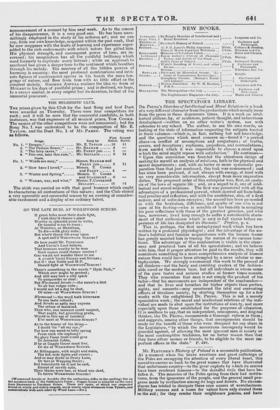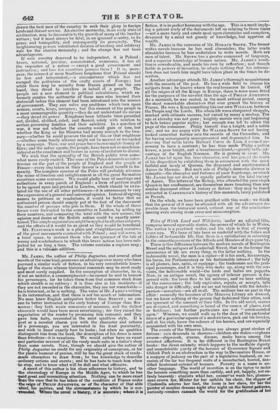Mr. FLETCHER'S History of Poland is a seasonable publication. At
a moment when the brave exertions and great sufferings of the Poles are occupying the attention of every liberal heart, this narrative carries us back to the great names that have illustrated that unfortunate country—to the great exploits by which its armies have been rendered famous—to the dreadful evils that have be- fallen it. The miseries of the Poles spring from their bad institu- tions, from the ignorance of the people, and the general small pro- gress made by civilization among its bogs and forests. No circum- stance has tended to dissipate these sure causes of wretchedness. Military success and a name for valour have only riveted theta, in the soil; for they render their neighbours kalous, and have
drawn the best men of the country to seek their glory in foreign lands and distant service. An elective monarchy, in an early state of civilization, may be favourable to the growth of many of the hardier virtues ; but it must always he fatal, in an ignorant country, to its peace and tranquillity, and consequently its prosperity. The neighbouring powers substituted division of territory and arbitrary rule for the elective monarchy ; and the change has not been advantageous.
If ever country deserved to be independent, it is Poland : brave, national, peculiar, concentrated, numerous, it has all the requisites of a nation — except a good government and instruction ; and how few countries possess these ! It is, more- over, the interest of more Southern kingdoms that Poland should be free and independent,—a circumstance which has not escaped the politicians of the crafty courts of Europe; but while there may be security from Russia gained on the one hand, they dread to interfere in behalf of a people. The people are a new element in political calculations, which ex- tremely puzzles the arithmetic of those men who learned their statecraft before this element had been introduced into the science of government. They can solve any problems which turn upon armies, courts, kings, intrigues ; but this element of the people is a most unmanageable quantity—they do not understand its nature —they dread its power. Kingdoms have hitherto been parcelled out, divided, clubbed, ruled, and fleeced, solely with relation to certain governing families and their satellites. In a question of war, it was not whether the country would gain or lose, but whether the King or his Minister had money enough in the trea- sury—whether he could procure the aid of this or that neighbour —whether some family alliance might not be marred or forwarded by a campaign. Thus, war and peace have been complete family af- fairs; and the active agents, the people, have been not so much con- sidered as the coachman and horses in a case of invitation to dinner.
We wish that the sympathy of the British public were some- what more easily excited. The case of the Poles &mends an inter- ference on the part of the people of England and the people of France—every step taken in their favour is a direct benefit to hu- manity. The complete success of the Poles will probably advance the name of freedom and enlightenment in all the great Sarmatian countries some centuries. We would gladly hear of meetings and collections in every parish of England : a form of petition ought to be agreed upon and printed in London, which should be circu- lated for the use of all other petitioners—it is unnecessary to vary the expression of a general and universal opinion. Instead of signing names to petitions or resolutions, it would be better that an authorized person should simply put at the foot of the document the number of persons who join in them. If the whole of these forms were forwarded to the committee in London, by adding up their numbers, and comparing the total with the new census, the opinion and desire of the British nation could be exactly ascer- tained. This simple organization might be applied to all other subjects, and the effects of it would be as great as they would be beneficial.
Mr. FLETCHER'S work is a plain and straightforward narrative of the great movements connected with Poland ; and will serve, in a brief space, to instruct those who are ignorant of the tale of wrong and wretchedness to which this brave nation has been sub- jected for so long a lime. The volume contains a copious map ; and this is a valable addition.



























 Previous page
Previous page